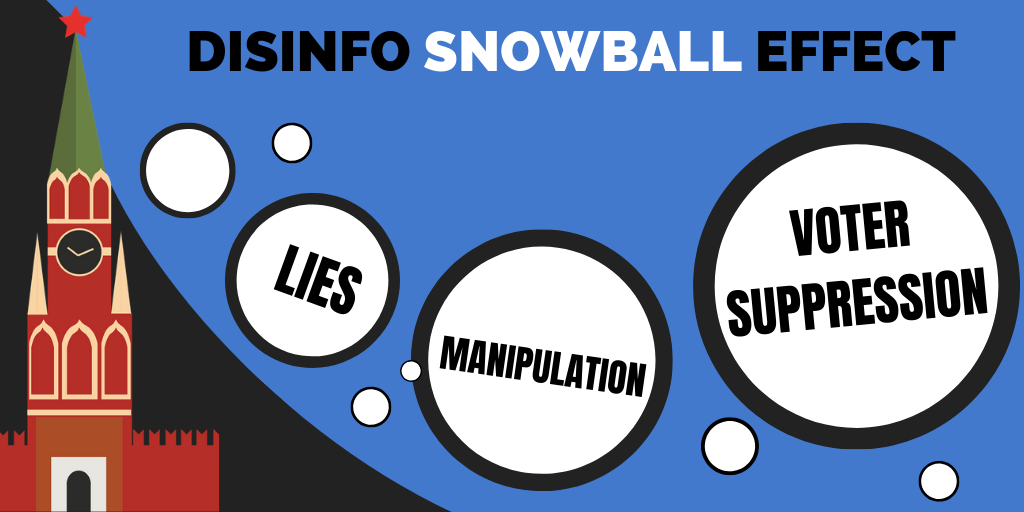First, a reminder: Russia’s disinformation campaign against the EU – and by extension, its electoral process – has been underway for five years. It is not a new feature of the European political landscape. The Kremlin’s efforts to undermine public support for the EU, promote populist and Eurosceptic parties and candidates, increase polarization and fragment European unity began in earnest in 2014, and have not relented since.
Russia is playing a long game in Europe: its objective is not merely to influence the outcome of any particular election, but rather to broadly subvert the efficacy of our democratic institutions, fuel widespread social fragmentation, and mistrust, and ultimately paralyze our ability to act in our own self-interest and to defend our values.
The Snowball Effect
Using various tactics and disinformation narratives, the Kremlin has been sowing the seeds of this discontent now for nearly half a decade
. It has habitually supported populist, anti-EU parties and candidates on both the far right and the far left, attacked the integrity of mainstream politics and media and emphasized the illegitimacy and futility of elections in a system it alleges to be fundamentally corrupt. Through these efforts, the Kremlin has empowered and amplified other venal and anti-democratic actors to grow their influence in Europe, creating a snowball effect for its anti-Western agenda.
Due to this meticulous groundwork and the long-term integration (and normalization) of anti-EU narratives in the public sphere, the Kremlin’s attempted manipulation of the EP elections looks far less sensational than other more infamous cases, such as #MacronGate or the 2016 US presidential election. But this doesn’t mean that no manipulation is taking place – on the contrary, the pro-Kremlin media continues to persistently attack the EU, its values, and its democratic mandate whilst simultaneously promoting Eurosceptic voices.
For example, Sputnik systematically features interviews with and updates of anti-EU parties as well as their candidates and positions. Sputnik Poland headlines anti-EU politicians, giving them space and promoting their narratives, while Sputnik Italy has given exclusive attention
to the national-conservative Fratelli d’Italia (Brothers of Italy) party. Questioning the legitimacy of European elections on grounds of corruption and the EU’s alleged capture by special interests is another common trope aimed at discouraging voter turnout.
Meanwhile, parties that do not question the EU’s future existence or promote their country’s secession from the EU face relentless criticism. If their top candidates are well-known, like in France, they are often subject to personal attacks. Similarly, mainstream media are accused of being biased and intentionally underreporting on the successes of Eurosceptic parties. Fact-checking initiatives also face growing criticism for supposedly infringing on free speech and promoting a “globalist” agenda.
Of course, the EU itself is subjected to all manner of misrepresentations and false narratives, most of which are grounded in the narrative of “lost sovereignty” or threatened national identity. For example, the EU stands accused of undermining the sovereignty
of its Member States: EU gun directives, forced migrant quotas, and Article 7 procedures are all just political tools designed to override national legislation. But that’s not all – the EU actually lacks true independence too, because it is just a vassal of the United States!
Finally, Europe’s progressive values are also consistently ridiculed and portrayed as an existential threat to the Christian moral tradition and conservative family values. The rights of women, ethnic and religious minorities and LGBTQ groups are particularly popular targets for disinformation. Even the recent tragedy at Notre Dame was exploited for this purpose – proof, apparently, that “our European civilization is dying.”
The best way to save it, the Kremlin would have us believe, is to give up on democracy entirely. How does that sound?
Read also:
- Putin said plotting a new refugee crisis to influence EU elections
- Russia-linked cyber attacks targeted 104 accounts of European think tanks
- Distraction as a tool of Russian propaganda
- Facebook to counter Kremlin-style info interventions in election campaigns
- Sanctions against Russia don’t damage the EU. But Italy, Hungary, and Austria might try to get them scrapped


